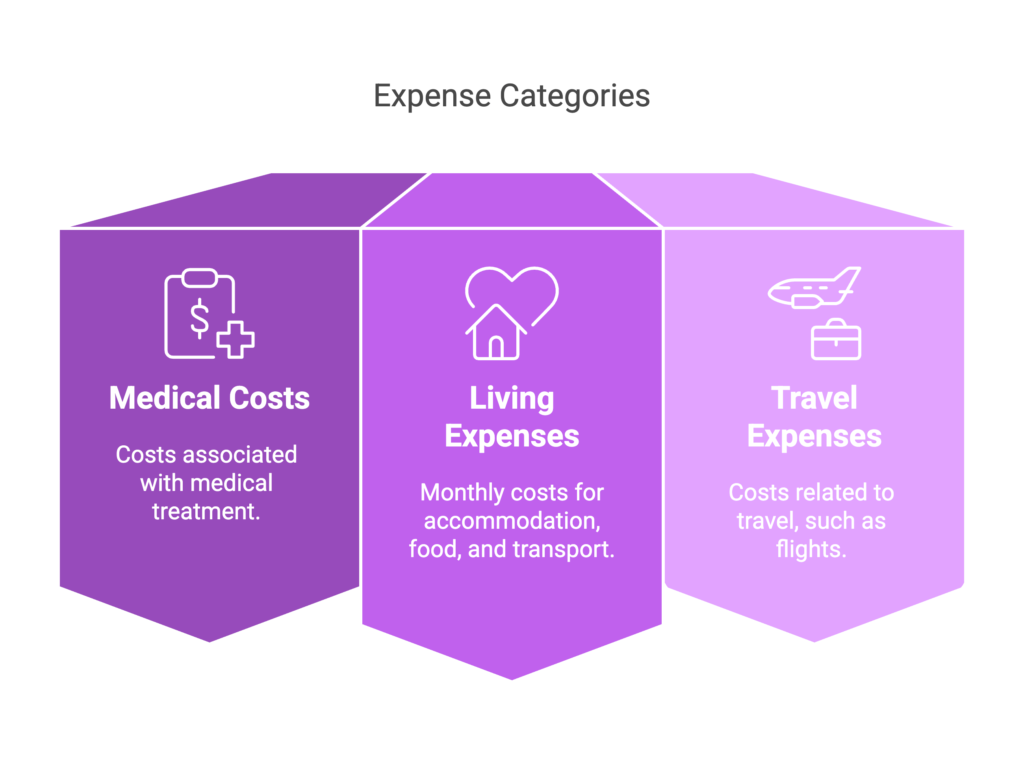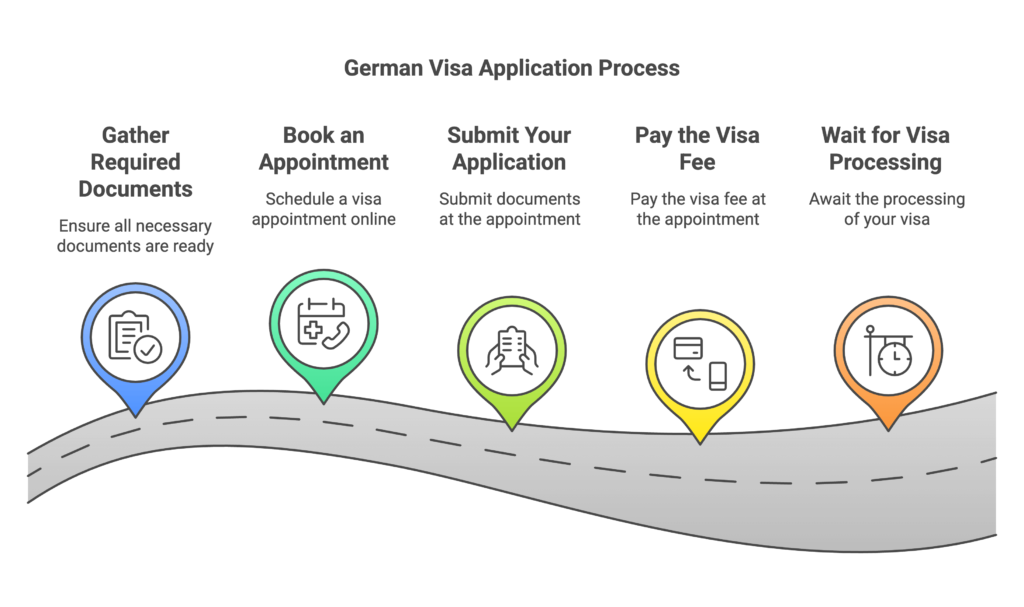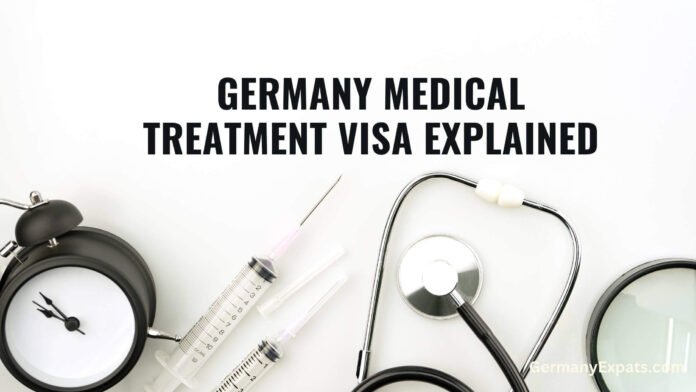A Medical Treatment Visa is a short-term visa granted to foreign nationals who must travel to Germany for medical reasons. Germany is renowned for its world-class healthcare system and advanced medical treatments. People worldwide travel to Germany to seek medical care that may not be available in their home country. Foreign nationals require a Medical Treatment Visa to access healthcare services in Germany. This guide provides all the essential details about this visa, including eligibility, application procedures, and required documents.
Overview of the Germany Medical Treatment Visa
Germany is a top destination for medical treatment, offering world-class healthcare, advanced medical technology, and specialized doctors. The Germany Medical Treatment Visa allows non-EU nationals to enter the country for medical care, whether for complex surgeries, specialized therapies, or long-term treatments.
Who Needs a Medical Treatment Visa for Germany?
Non-EU citizens seeking medical treatment in Germany must apply for a Medical Treatment Visa. This visa is required for patients undergoing planned procedures, surgeries, or rehabilitation services. Sometimes, family members or caregivers accompanying the patient may also need a visa.
Benefits of Seeking Medical Treatment in Germany
Germany is known for its cutting-edge medical research, highly skilled doctors, and state-of-the-art facilities. Patients benefit from shorter waiting times, high success rates in complex treatments, and access to specialized care unavailable in many countries. The country’s strict healthcare regulations also ensure high safety and quality standards.
Understanding the Germany Medical Treatment Visa
Definition and Purpose
The Germany Medical Treatment Visa is an excellent opportunity for non-EU citizens seeking medical care in Germany. It allows patients to travel to the country for specialized treatments, surgeries, or long-term therapies that might not be available back home. Plus, this visa supports those who want to accompany the patient, like caregivers or family members, ensuring that they can share this journey.
Difference Between a Medical Visa and Other German Visa Types
Unlike a standard tourist or business visa, the medical treatment visa is for healthcare purposes. Key differences include:
- Tourist Visa: This allows short-term travel for leisure, but medical treatment is not its primary purpose.
- Schengen Visa: This visa covers short stays in Germany and other Schengen countries but may not be suitable for long-term treatment.
- National Visa (D-Visa): The medical visa falls under this category if the treatment requires an extended stay beyond 90 days.
The medical treatment visa is issued based on the duration of the treatment:
- Short-Term Medical Visa (Schengen Visa Type C):
- Valid for up to 90 days within 180 days.
- Suitable for minor procedures, consultations, or short-term therapies.
- Typically issued for single or multiple entries based on medical needs.
- Long-Term Medical Visa (National Visa Type D):
- Required for treatments lasting more than 90 days.
- Allows multiple entries and may be extended based on medical necessity.
- It can be converted into a residence permit if long-term treatment is needed.
Who is Eligible for a Germany Medical Treatment Visa?
The Germany Medical Treatment Visa is available for individuals who require medical care in Germany. Eligibility depends on the patient’s condition, the necessity of treatment, and supporting documentation from a recognized medical institution.

Patients Seeking Specialized Treatment
This visa is primarily for non-EU citizens who need specialized medical care in Germany. Patients diagnosed with serious illnesses, rare diseases, or conditions that require advanced treatment unavailable in their home country can apply. To qualify, they must have a confirmed medical appointment with a hospital or clinic in Germany. Many patients travel for complex surgeries, advanced therapies, or innovative treatments that are inaccessible elsewhere.
Individuals Seeking Follow-Up Medical Care
Patients who have already received treatment in Germany may need to return for follow-up consultations, rehabilitation therapy, or post-operative checkups. This visa allows individuals to continue their medical care under the supervision of the same specialists. Chronic disease patients who require ongoing evaluation and long-term treatment also fall under this category.
Caregivers and Family Members Accompanying Patients
Family members or caregivers accompanying a patient can also apply for a visa. This includes spouses, parents, or children providing emotional or physical support during treatment. If the patient is a minor or unable to travel alone, a legal guardian or personal caregiver may be required to accompany them. The visa for accompanying individuals is typically linked to the patient’s medical visa and shares the same duration.
Types of German Medical Treatment Visas
Germany offers two types of medical treatment visas, depending on the duration and nature of the medical care required. Patients must choose the correct visa based on their treatment plan and expected stay in the country.
Short-Term (Schengen) Medical Visa (Type C)
The Schengen Medical Visa is for patients who need medical care in Germany for up to 90 days within 180 days. It allows individuals to receive short-term treatments, consultations, or minor medical procedures. This visa suits those requiring temporary medical attention without an extended stay.
Eligible Medical Treatments for a Schengen Medical Visa
Patients undergoing medical evaluations, minor surgeries, or short-term rehabilitation may apply for this visa. It is also ideal for follow-up checkups or second opinions from German specialists. However, a national visa is necessary if the treatment requires long-term hospitalization or extensive therapy beyond 90 days.
Long-Term (National) Medical Visa (Type D)
The National Medical Visa is for patients needing medical treatment in Germany for more than 90 days. It allows multiple entries and can be extended if medically necessary. This visa is ideal for patients undergoing long-term therapies, major surgeries, or rehabilitation programs that require extended stays.
When is a National Medical Visa Required?
Patients who require complex medical procedures, ongoing cancer treatments, organ transplants, or specialized therapies over several months must apply for this visa. It is also necessary for those who need rehabilitation after surgery or long-term hospitalization. Sometimes, the visa can be converted into a residence permit if prolonged medical care is required.
Germany Medical Treatment Visa Requirements
To apply for a Germany Medical Treatment Visa, applicants must provide specific documents proving their medical care’s necessity and their ability to support themselves during their stay. Fulfilling these requirements is essential for a successful visa application.
General Documentation Checklist
Applicants must submit a completed visa application form, a valid passport with at least two blank pages, and recent biometric passport-size photos. They must also provide a cover letter explaining the purpose and duration of the medical stay and proof of accommodation arrangements, either in a hospital or a private residence.
Proof of Medical Necessity and Treatment Plan
A key requirement is an official medical report from a doctor in the applicant’s home country confirming the need for treatment in Germany. The patient must also submit a formal letter from a recognized German hospital or clinic detailing the treatment plan, estimated duration, and total cost. This document must confirm the hospital’s willingness to provide medical care.
Financial Proof and Sponsorship Requirements
Applicants must prove they can afford medical treatment and living expenses in Germany. They can submit personal bank statements, proof of income, or a sponsorship letter from a guarantor covering the costs. If a German-based sponsor is responsible, they must provide a Declaration of Commitment (Verpflichtungserklärung) from the local immigration office. Sometimes, a home country’s government or an international health organization may cover the medical expenses.
Health and Travel Insurance Coverage
Health insurance is mandatory for all medical visa applicants. The insurance policy must cover medical emergencies, hospitalization, and repatriation in case of unexpected health complications. If the treatment is short-term, travel medical insurance is required. Comprehensive health insurance from a German provider may be necessary for long-term therapies.
Medical Invitation Letter for a Germany Medical Visa
A medical invitation letter is crucial for obtaining a Germany Medical Treatment Visa. It is official confirmation from a German hospital or clinic that the patient has been accepted for medical treatment. This letter helps verify the legitimacy of the visa application and provides essential details about the planned treatment.
Who Issues the Invitation Letter?
A recognized German hospital, clinic, or medical specialist must issue the invitation letter. The treating physician or hospital administration typically provides it after reviewing the patient’s medical records. The document must be printed on the hospital’s official letterhead and signed by an authorized representative to ensure authenticity and approval.
Essential Information to Include
The medical invitation letter must contain the following details:
- Patient’s Full Name and Passport Details – This ensures proper applicant identification.
- Hospital or Clinic Information – Includes the medical institution’s full name, address, and contact details.
- Summary of the Medical Condition – A concise outline of the patient’s illness and the need for treatment in Germany.
- Proposed Treatment Plan – A detailed explanation of the necessary medical procedures, therapies, or surgeries.
- Estimated Duration of Treatment – Indicates how long the patient is expected to remain in Germany.
- Total treatment costs, including hospital charges, doctor fees, and medications.
- Confirmation of the Hospital’s Readiness to Provide Treatment – Assurance that the patient has been accepted for treatment and has a scheduled appointment.
Sample Medical Invitation Letter Format
Here is a basic template for a medical invitation letter:
Proof of Medical Treatment and Hospital Confirmation
A Germany Medical Treatment Visa application requires proof that the patient has been accepted for treatment by a German hospital or clinic. This confirmation is critical because it assures the embassy that the patient has a legitimate medical reason for traveling.
How do you obtain a treatment confirmation from a German hospital?
Patients must contact a recognized German hospital or specialist to get a treatment confirmation and submit their medical reports, diagnosis, and treatment history. The hospital will review the case and determine if it can provide treatment. It will issue an official treatment confirmation letter stating it is ready to treat the patient if accepted.
If the hospital offers such services, patients can request this letter via email or through an international patient coordinator. Some hospitals may require an advance deposit or partial prepayment before issuing the confirmation.
Alternative Proofs if Hospital Confirmation is Delayed
If the hospital confirmation letter is delayed, patients can submit alternative proof to support their visa application:
- Email correspondence with the hospital – screenshots or copies of emails confirming treatment discussions.
- Appointment Confirmation – A letter from the hospital confirming a consultation has been scheduled.
- Proforma Invoice or Treatment Cost Estimate – A document that provides an initial cost estimate issued by the hospital.
- Medical Referral Letter from Home Country – A letter from the patient’s doctor explaining the necessity of treatment in Germany.
Financial Proof: How Much Money Is Required?

Applicants for a Germany Medical Treatment Visa must demonstrate that they can cover the costs of medical treatment, travel, and living expenses. The German embassy requires clear financial proof to ensure patients can sustain themselves without relying on public funds.
Minimum Bank Balance Requirement
The required bank balance depends on the treatment cost and the expected stay duration. There is no fixed amount, but applicants should have enough funds to cover the following:

- Medical treatment costs, as stated in the hospital confirmation letter.
- Living expenses typically range between €900 and €1,200 per month for accommodation, food, and transport.
- Travel expenses, including return flight tickets.
A minimum of €10,000 to €15,000 may be required for short-term treatments, while long-term treatments can cost significantly more. The embassy will assess whether the patient has sufficient financial means based on the submitted documents.
Acceptable Sources of Funds
Applicants can prove financial stability through various sources, including:
- Personal Bank Statements – Recent statements (usually from the last three to six months) showing sufficient funds.
- Fixed Deposits or Investments – If liquid funds are unavailable, proof of assets may be accepted.
- Health Insurance Coverage – If a health insurance provider covers the treatment, a confirmation letter from the insurer is required.
- Employer Letter or Business Income – For employed or self-employed individuals, proof of income can support the application.
Sponsorship from Family or Charitable Organizations
A sponsor may take financial responsibility if the patient cannot fund the treatment alone. Sponsors can be:
- Family members are willing to cover the medical and living costs.
- Charitable or humanitarian organizations assist patients in need of critical medical care.
- A German-based sponsor must provide a Declaration of Commitment (Verpflichtungserklärung) from the local immigration office.
Sponsors must submit their bank statements, proof of income, and a notarized letter confirming their commitment to cover all expenses. The embassy may also require documents proving the relationship between the patient and the sponsor.
Can Caregivers and Family Members Travel on a Medical Visa?
Family members and caregivers are essential in supporting patients undergoing medical treatment. They can often apply for a visa to accompany the patient, but specific rules and documentation are required.
Who Can Accompany a Patient?
When supporting loved ones, close family members like spouses, parents, children, and siblings can apply for a visa to accompany the patient on their journey. Having a legal guardian or caregiver is often essential for minors or older people. Personal caregivers, including nurses and medical assistants, are also welcome to travel if the patient requires ongoing medical assistance.
The process of approving the visa for those accompanying the patient depends on their medical condition and the importance of having their loved ones by their side. If the patient needs help with daily activities or can’t travel alone, it dramatically boosts the chances of getting a visa for a caregiver.
Special Considerations for Minors and Elderly Patients
Minor patients must be accompanied by a parent or legal guardian. If only one parent travels, the other parent must provide a notarized consent letter allowing the child to travel. In some cases, courts may require additional legal documents.
For elderly patients or those with severe medical conditions, a caregiver’s visa application may require extra medical documentation proving that assistance is essential. If the patient has a disability or critical illness, medical reports must highlight why a caregiver is necessary for daily activities.
How to Apply for a Medical Treatment Visa?

Step 1: Gather Required Documents: Ensure you have all the documents listed above before proceeding with your application.
Step 2: Book an Appointment: Visit the official website of the German Embassy or Consulate in your home country and schedule an appointment to submit your visa application.
Step 3: Submit Your Application: Bring all the required documents to your visa appointment. You may also be required to attend an interview.
Step 4: Pay the Visa Fee: The Schengen Medical Treatment Visa fee is approximately €80. However, the fee may be waived or reduced in some instances (such as humanitarian medical cases).
Step 5: Wait for Visa Processing: The processing time usually takes 10-15 working days, but it may take longer in some cases.
Finding the Right Doctor or Hospital in Germany
Choosing the right medical facility is crucial for ensuring high-quality treatment in Germany. Before making a decision, patients must consider factors such as hospital reputation, specialist expertise, treatment costs, and location.
How to Choose the Best Medical Facility?
Germany has some of the world’s best hospitals and medical centers, specializing in various treatments, from cancer care to organ transplants. When selecting a hospital or doctor, consider the following:
- Accreditation and Reputation – Look for hospitals with international accreditations, such as the Joint Commission International (JCI) certification.
- Specialization – Choose a hospital that specializes in the specific treatment required. University hospitals and research institutes often provide cutting-edge medical care.
- Success Rates and Patient Reviews – Check for patient testimonials, hospital rankings, and medical success rates for the treatment needed.
- Language Support – Many hospitals offer international patient services, including translators for non-German speakers.
- Treatment Costs and Payment Options – Compare costs across different hospitals and check if they accept international insurance or require advance payments.
Online Portals and Resources for Finding Specialists
Several online platforms help international patients find the right doctor or hospital in Germany. These resources provide hospital rankings, specialist directories, and patient reviews:
- • Germany Health (www.germanyhealth.de) – Lists top hospitals and doctors for various medical conditions.
- • TK Doctor Finder (www.tk.de) – A German health insurance portal that helps locate specialists.
- • Klinikbewertungen (www.klinikbewertungen.de) – A review platform where patients share hospital experiences.
- • Uni-Kliniken (www.unikliniken.de) – A directory of university hospitals in Germany specializing in advanced treatments.
Patients can use these resources to compare hospitals, read about specialists, and even book consultations.
Summary of Key Takeaways
- Germany is a leading destination for medical treatment, offering advanced healthcare, expert specialists, and world-class facilities.
- The Germany Medical Treatment Visa allows non-EU citizens to enter the country for medical care, with short-term (Schengen Visa) and long-term (National Visa) stay options.
- Eligibility includes patients needing specialized treatment, follow-up care, or rehabilitation and family members or caregivers accompanying them.
- Applicants must provide a medical invitation letter from a German hospital detailing the treatment plan, costs, and duration of stay.
- Financial proof requires sufficient bank balance, sponsorship, or health insurance to cover medical expenses and living costs.
- Caregivers and family members can apply for a visa, but they must prove their relationship with the patient and their financial ability to support themselves.
- Choosing the right hospital or specialist is key, and online platforms like Germany Health, TK Doctor Finder, and Klinikbewertungen help find top medical facilities.
- Pre-treatment consultations with German hospitals ensure that patients receive proper guidance before traveling for medical care.
A well-prepared visa application, supported by substantial medical and financial documentation, increases the chances of approval and a smooth treatment journey in Germany.
Frequently Asked Questions (FAQs)
1. Can I bring a family member on a Medical Treatment Visa?
A companion visa can be applied if a family member needs to assist you during treatment. Proof of necessity is required.
2. What happens if my visa application is rejected?
You will receive a reason for rejection, and you can either appeal the decision or reapply with improved documentation.
4. Can I work in Germany with a Medical Treatment Visa?
No, this visa does not permit employment. It is strictly for medical purposes.
5. How long does it take to get a Medical Treatment Visa?
It generally takes 10-15 working days, but delays may occur due to additional processing.

